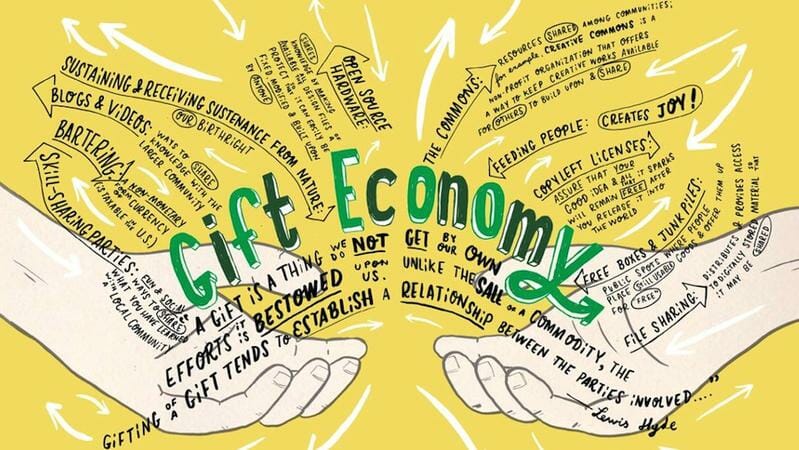
A gift economy challenges conventional economics which assumes individuals are utility maximisers based on observable monetary gain.
Traditionally economics assumes households seek to maximise their economic welfare through increasing their income and then purchasing the optimal combination of goods assuming their budget. Classical economics assumes firms seek to maximise profit.
The gift economy recognises that in the real world, this is only a partial understanding of what motivates individuals and communities. The gift economy places greater value on qualitative relationships between dependent people. The commodity economy places greater value on quantitive trade of goods.
Reasons for a gift economy
Why do individuals and society develop a gift economy?
Creates social bonds and trust. If we offer a service to a neighbour, we may feel that our neighbour will appreciate our effort and be more willing to return a favour in the future. If we charged for our service, we would feel more mercenary and the neighbour may not feel the need to return the favour. Anthropologist Marcel Mauss, who wrote ‘The Gift: Forms and Functions’ notes many examples of where reciprocal gift-giving is important for creating social bonds, trust and community.
Disequilibrium. Classical economics is concerned with market equilibrium and paying a price equal to the marginal cost of producing the good. Lewis Hyde in the 1983 book “The Gift” argues the purpose of the gift economy is to disrupt equilibrium but create a new sense of obligation and duties. So when we offer something for free – other people feel a sense of obligation and responsibility in return.
Long-term social relationships. In close-knit communities, the most valuable transactions are long-term and depend on reputation, trust and social perceptions. Giving gifts can help cement a person’s position in society and gain the trust and respect of others. To avoid your expected duty to give could harm your reputation, which could prove a high economic cost in the long-term.
“Gift exchange is an exchange of inalienable objects between people who are in a state of reciprocal dependence that establishes a qualitative relationship between the transactors.”
Chris Gregory, “Gifts and Commodities” (1982).
Societies where there is interdependency. Gift exchange economies are more likely to emerge in societies where people live in small and observable communities. In traditional village societies, if you break social norms you stand out. In a society of five million, it is much easier to be a ‘free-rider’ and avoid giving gifts because people won’t notice.
Pure altruism. If we see a member of the community in need, we may offer charitable aid, – even if it is anonymous – not because we expect something in return, but we feel it is a worthwhile and good thing to do. For example, if we saw a homeless person, we may take them into our house – even if it was inconvenient to ourselves.
Philanthropy as a way to boost reputation. In the nineteenth/twentieth century, those who became very rich, such as N. Rockefeller, J.P. Morgan and Andrew Carnegie (famous philanthropists) began to give away large parts of their money. Philanthrophy may become a way to boost the reputation of those who give.
The joy of giving. A classical economists may suggest that if we get a great sense of satisfaction from doing the ‘right thing’ we are actually maximising our utility by offering a gift. Individuals do not just get utility from consuming goods and services. Some may get a higher utility from a sense of being selfless
Does modern society work against the gift economy?
Some anthropologists claim that a gift economy is quite common amongst a variety of developing societies, but it is the nature of modern economies to work against the bonds and pressures which promote a gift economy.
Factors which undermine the gift economy
- Breakdown of extended family. A gift economy is more likely to emerge where a significant proportion of transactions are amongst family members or close neighbours. In modern society, there is a greater turnover of relationships and less connection with neighbours and extended family.
- Size of cities. In a city of several million, it is easier to be a ‘free-rider‘ – there is less sense of dependence because if you give a gift to someone, you are unlikely to ever meet them again. Nevertheless, this issue can be overcome if local communities within a city develop a shared sense of identity.
- The prevalence of markets. When everything becomes commoditised it is harder to create a role for gift economies. If we become used to paying a monetary price or receiving payment, the idea of a gift economy becomes weaker. Michael Sanders in “The Moral Limits of Markets” argues that the prevalence of markets could undermine social issues. For example, paying people to queue on your behalf undermines a sense of fairness that everyone is in it together. Another example may be health insurance, where insurance companies have a financial incentive to make it difficult to claim the best health treatment – so we get the opposite of a gift economy.
Image from:
Find out more in this educational fun video:
And another good in-depth read on gift economy:
https://www.newworldencyclopedia.org/entry/Gift_economy